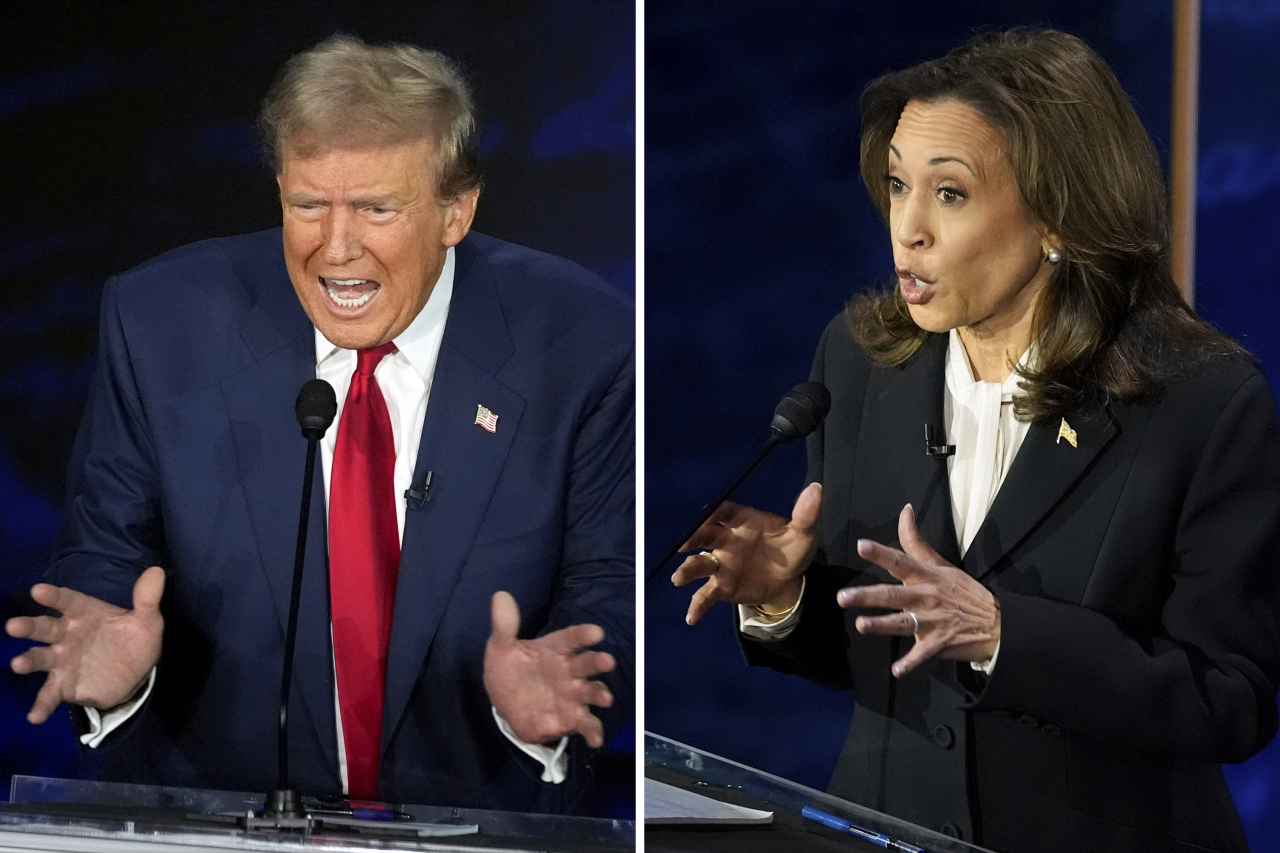 |
This combination of photos shows Republican presidential nominee former President Donald Trump, left, and Democratic presidential nominee Vice President Kamala Harris during an ABC News presidential debate at the National Constitution Center, on Tuesday, in Philadelphia. (AP) |
US Vice President Kamala Harris and former President Donald Trump traded sharp barbs on Tuesday, spotlighting their sharply contrasting views on North Korean leader Kim Jong-un, treaty alliances and a host of pivotal foreign policy issues.
The televised presidential debate, the first between these two candidates, continued past the original 90-minutes scheduled, notably sidestepping North Korea and rising tensions on the Korean Peninsula, including Pyongyang's illicit nuclear buildup and its development of missiles capable of striking the US mainland.
But one thing was evident: Harris and Trump hold distinctly different perceptions of the North Korean leader, who held three in-person summits with Trump between 2018 and 2019 and exchanged at least 27 personal letters, according to publicly disclosed records.
Harris criticized Trump for his personal rapport with Kim, who she labeled as a "dictator," while pushing back against Trump's accusation that she harbors hostility toward Israel.
"He's trying to, again, divide and distract from the reality, which is it is very well known that Donald Trump is weak and wrong on national security and foreign policy. It is well known that he admires dictators, wants to be a dictator on Day 1, according to himself," Harris said.
"It is well known he exchanged love letters with Kim Jong-un. And it is absolutely well known that these dictators and autocrats are rooting for you to be president again because they're so clear they can manipulate you with flattery and favors."
Harris further contended, "It is well known that he said of Putin that he can do whatever the hell he wants and go into Ukraine," emphasizing the need for a president who is not "consistently weak and wrong on national security" and who upholds the military with the highest respect and regard.
In contrast, Trump argued that the fear North Korean leader Kim Jong-un, Chinese President Xi Jinping and Russian President Vladimir Putin have for him contributes to maintaining global security, while dismissing Harris's claim that "world leaders are laughing at Donald Trump."
"Let me just say about world leaders, Viktor Orban, one of the most respected men, they call him a strongman. He's a tough person. Smart prime minister of Hungary. They said, 'Why is the whole world blowing up?'" Trump countered.
“He said, ‘Because you need Trump back as president. They were afraid of him. China was afraid.’ And I don't like to use the word afraid, but I'm just quoting him. 'China was afraid of him. North Korea was afraid of him.' Look at what's going on with North Korea, by the way. He said 'Russia was afraid of him,'” Trump added.
Orban, hailed by Trump supporters and conservative populists, is known for his hard-line stances on immigration and LGBTQ+ rights, as well as his controversial crackdowns on the press and judiciary, all while maintaining close ties with Russia.
Harris and Trump also revealed sharply contrasting views on defense budget contributions and the value of NATO as a military alliance -- an issue that could similarly apply to the South Korea-US alliance, although the debate did not address matters related to the Korea-US partnership or the Korean Peninsula.
On NATO's defense budget, Trump reiterated his calls for increased defense contributions, stating, "We were being ripped off by European nations, both on trade and on NATO. I got them to pay up by saying one of the statements you made before, 'If you don't pay we're not going to protect you.'"
Harris antithetically underscored the importance of America's role as a global leader in upholding a rules-based order and defending democratic principles.
"The reality has been about standing as America always should, as a leader upholding international rules and norms, as a leader who shows strength, understanding that the alliances we have around the world are dependent on our ability to look out for our friends and not favor our enemies -- because you adore strongmen, instead of caring about democracy," she said. "And that is very much what is at stake here."
Harris emphasized that a US president should fully grasp the country's role and responsibilities on a global stage, highlighting the gravity of the presidency in a worldwide context.
"The president of the United States is commander-in-chief and the American people have a right to rely on an American president who understands the significance of America’s role and responsibility in terms of ensuring there is stability and ensuring we stand up for our principles and not sell them for the benefit of personal flattery," she added.







![[Herald Interview] How Gopizza got big in India](http://res.heraldm.com/phpwas/restmb_idxmake.php?idx=644&simg=/content/image/2024/11/20/20241120050057_0.jpg)